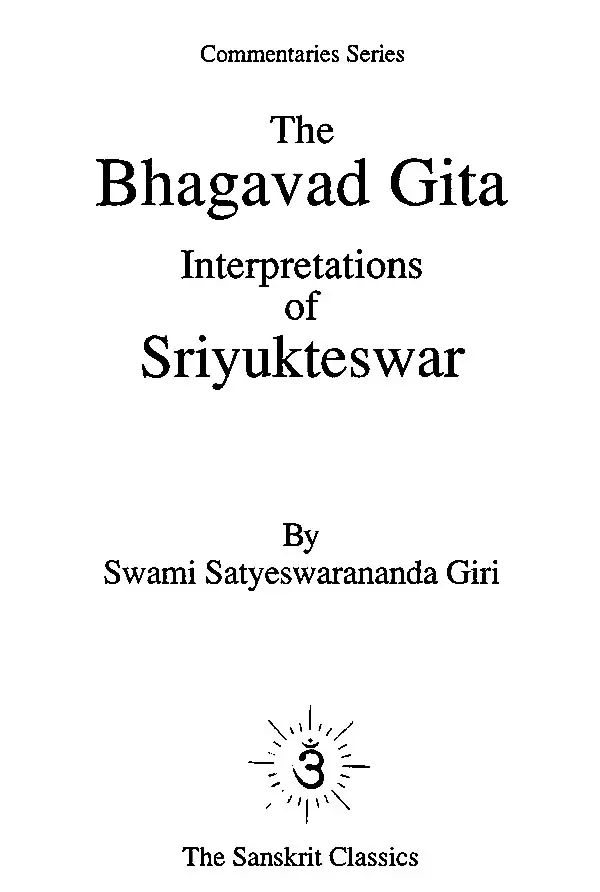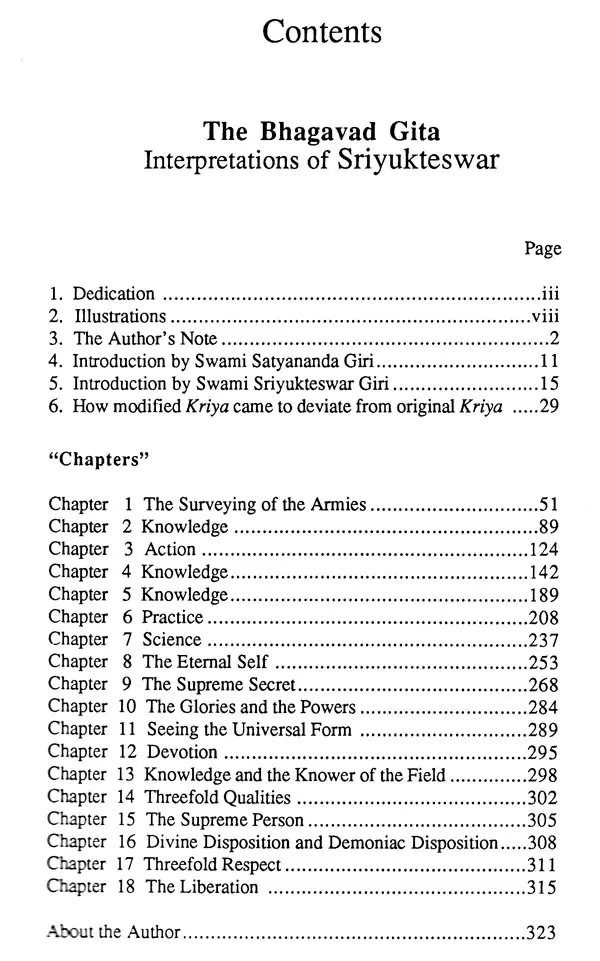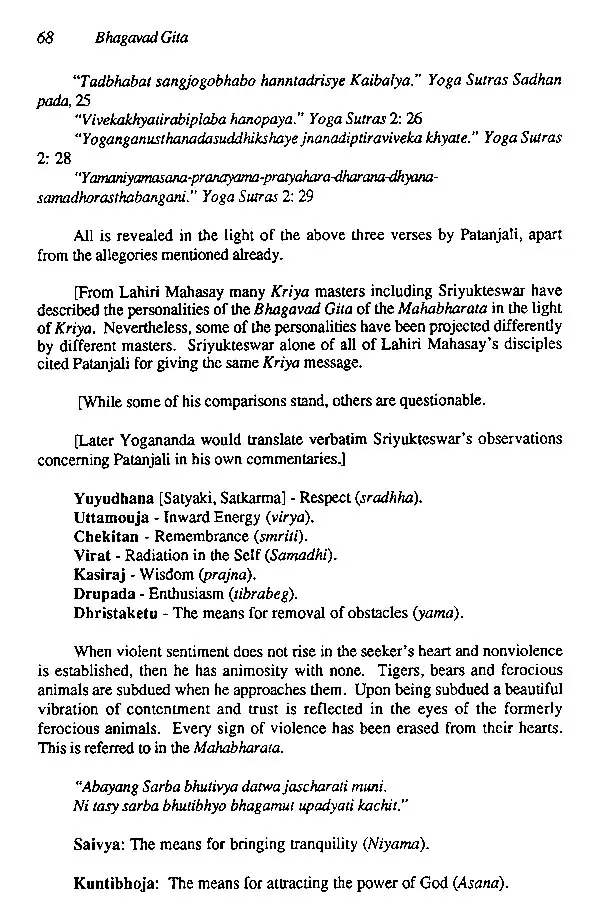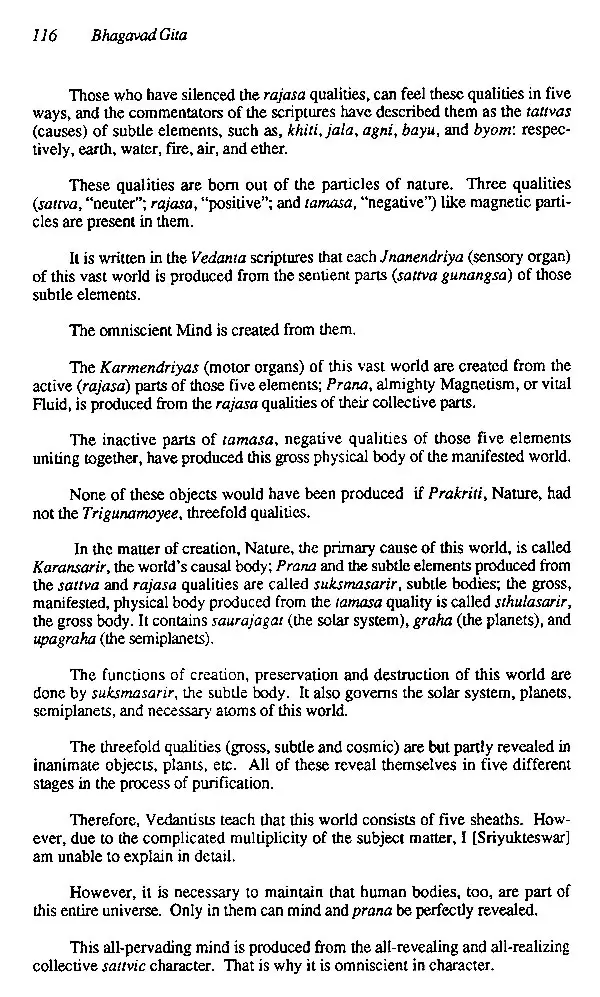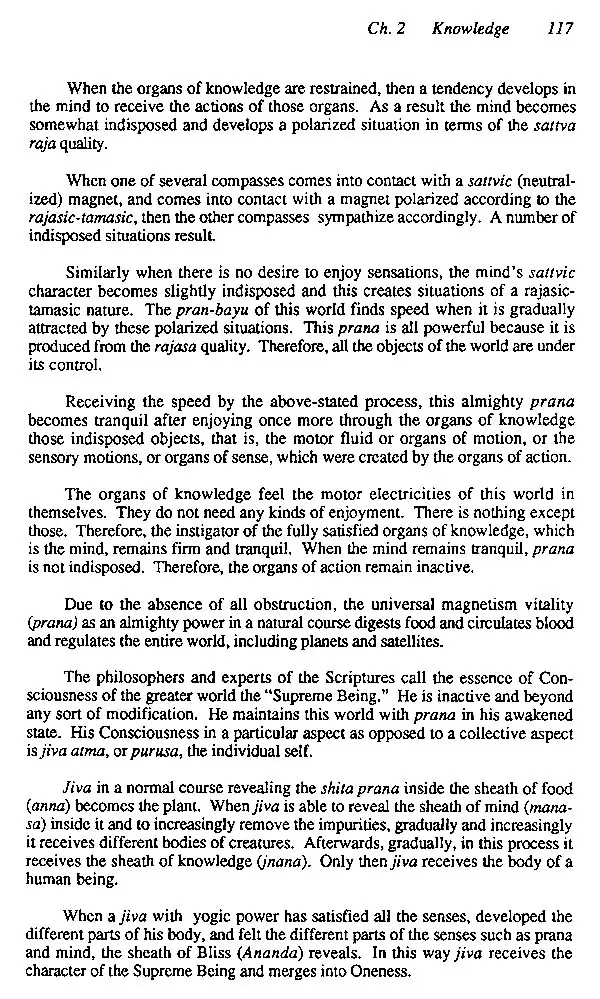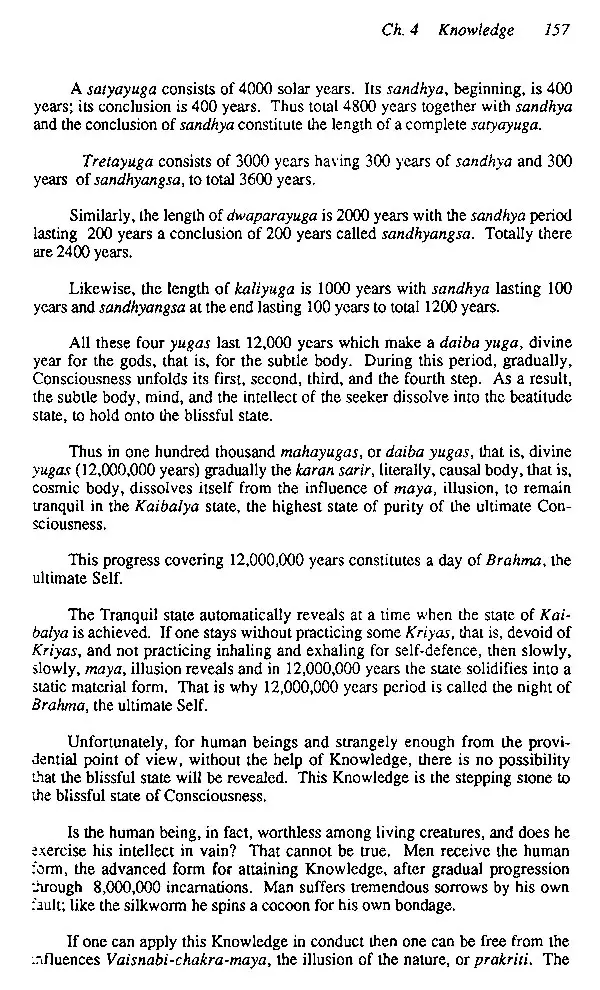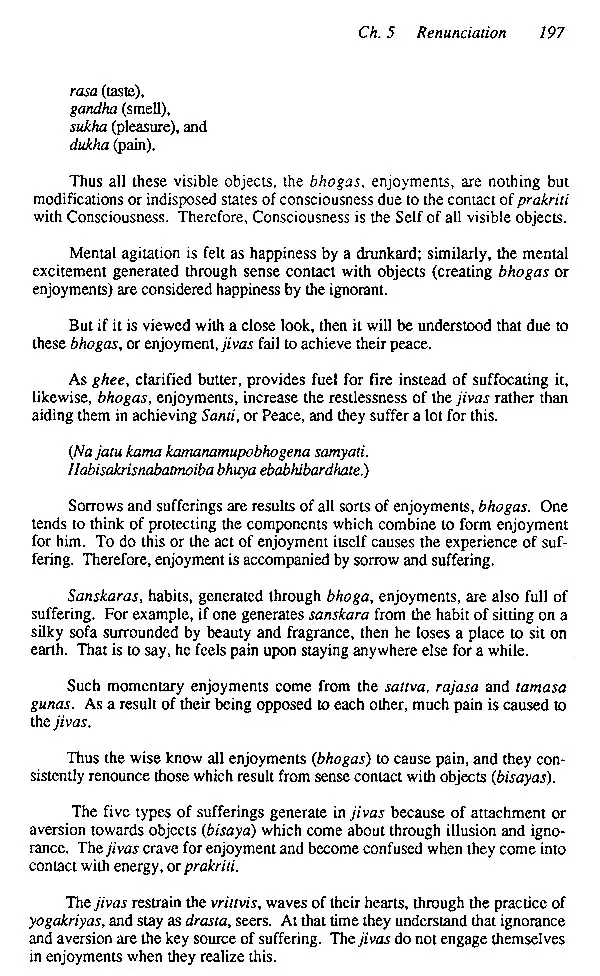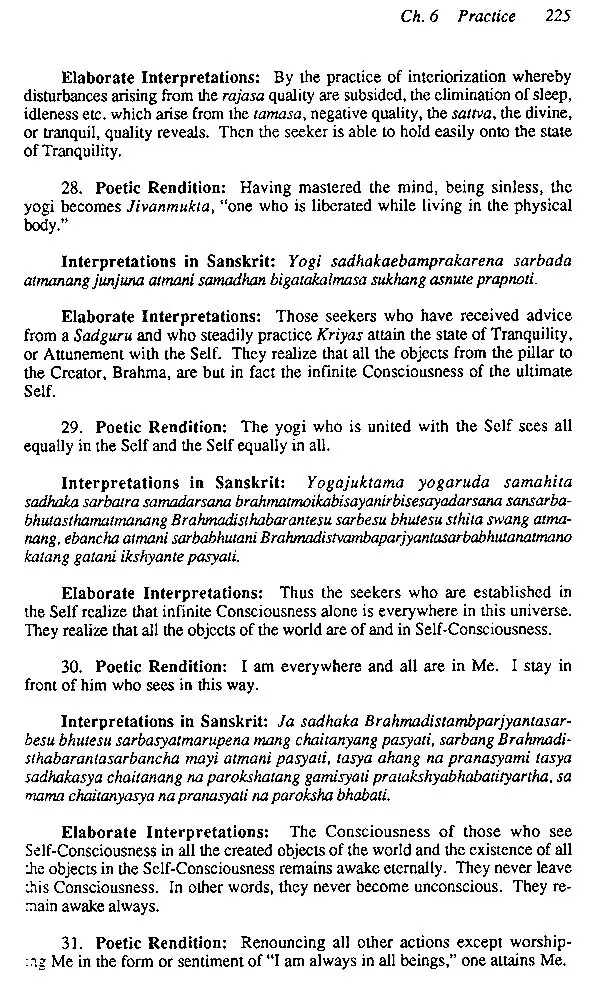
The Bhagavad Gita Interpretations of Sriyukteswar
Book Specification
| Item Code: | UAI608 |
| Author: | Swami Satyeswarananda Giri |
| Publisher: | The Sanskrit Classics |
| Language: | English |
| Edition: | 1991 |
| ISBN: | 1877854123 |
| Pages: | 328 ( With 12 B/w Illustrations) |
| Cover: | PAPERBACK |
| Other Details | 9.00 X 6.00 inch |
| Weight | 450 gm |
Book Description
Om, Purna mad, Purna midang
Purnat Purnamudachyate, Purnasya, Purnamadaya,
Purnamebabasisyate.
Om Santi, Santi, Santi.
Sri Sri Gurabe namah.
Truth, Consciousness, and Bliss are pure Consciousness and are all pervading.
This manifested world is filled with the pure Consciousness having dif ferent names and forms. Consciousness and the manifested world have evolved from the pure Consciousness of the ultimate Self. Therefore, when the mani fested aspect is forsaken, pure Consciousness and Bliss remain.
Remembering the holy feet of my divine Gurudev, having Peace, and for establishing Peace in the universe, with tranquility I state the invocation of this Holy Scripture.
The Sudras, the fourth class, possess no right to Mantra, and Brahmana, and it says in the Upanisads that they do not have the right to read the Vedas (Rik, Sama, Yaju and Atharva).
Maharshi Krisna Dwaipayan Vedavyasa wrote a fifth Veda, that is, the Mahabharata and considered it to be Vedanta Scripture.
Vedanto namo Upanishad Pramanag Tadupakarini.
Saruraka Sutradinicha. Vedanta Sar. Verse 2.
The purpose of the Vedanta scripture is to reveal Knowledge, dispelling ignorance and doubt. But in the study of the scripture, reason is essential.
The wise have described the study of the scripture as the churning of curds. It is necessary to have food in order to live, but the intake of curd causes one to catch cold and to cough, or even to develop rheumatism. Longevity may be cut short and death may be hastened. However, if this curd is churned with a churning stick, the unnecessary portion is disposed of, and butter may be taken which will bring satisfaction, strength and the increase of longevity.
Likewise, when the knowledge of the scripture is studied with blind faith, then restlessness, pride, egotism, intellectual understanding and anger are increased, and gradually the person is covered with ignorance.
But if one utilizes the stick of reason during the study of the scriptures, discarding the unnecessary portions and accepting the essence, then satisfaction and Peace are produced, and ignorance is dispelled.
As a result, the radiant realization of Knowledge is gained. So, one must not study the scripture without reason and knowing the reputation of the author.
It must be understood that even the sage makes mistakes. For this reason, an author of the scriptures said. "If the advice of a child is reasonable, one should accept it, but unreasonable advice should be forsaken even if it comes from Brahma, the Creator, himself."
Depending only on the scriptures, one should not make serious decisions without applying reason. When one makes such decisions without reason, it is called unrighteousness.
Juktijuktam upadeyanag bachanang balakadepi
Anyang trinamiba tegamapurktang padmajanmana.
Kebalang sastramashritya na kartabyo biniruaya.
Juktihanang bicharetu dharmakari prayayate.
Before studying the scriptures, one must consider four important points. These four points are said to be requirements:
1. The subject of the scripture 2. The relation between the subject of the scripture and the reader
3. The necessity of the subject matter
4. Whether or not the person is qualified to read the subject matter.
Tatranubandho nama adhikari bisaya sambandha prayojanani : Vedantrasar. Verse 4
With regards to subject matter, relation and necessity, the Vedanta advises as follows:
"Bisaya jib Brahmaikyang Sudhhachaitanyang pramayang tatraiba.
Vidantanang tatprajyat. Sambandhastu tadaikya pramayasya
Tet prati padakopanishad pramanasya cha bodhya bodhaka.
Babha lakshana. Prayojanantu tadaikya pramayagata jyana
Nivritti tatswarupananda byapti cha. Tarati sokamatmabit
Ityadi shruti Brahmabed Bralunaiba bhavati ityadi shrutescha" Vedantrsar Verse 10.
The purpose of Vedantasar is to explain that jiva (individual beings) and Brahma (the ultimate Self) are, in fact, the same One Self in pure Conscious ness. This pure Consciousness is the subject matter of Vedanta.
The Oneness between the individual self and the ultimate Self (or the seek ing self and the pure Self) is the subject matter of knowing, or realizing.
The seeking self is the knower while the supreme Self is the known. This is called relation. Finally, with the attainment of Oneness between the seeking self and the ultimate Self, ignorance is dispelled and knowledge of Oneness is the necessary, that is, the inevitable and invariable consequence.
It is said in the Veda that Self-realized persons overcome sorrow and become one with Brahma, the ultimate Self.
Lastly, the discussion of who is qualified to study this Bhagavad Gita is a lengthy one.
However, the reason a Sudra" is disqualified to study the Veda can be simply stated as follows:
A Sudra has no right to utter OM (Pranab), and without uttering OM, one cannot study the Vedas.
When ordinary people read this information, they may consider the author of the holy scripture as being cruel and prejudiced, since this is the level of understanding in common people.
On the contrary, the authors of the holy scriptures are Brahmana, meaning they are simple and honest. They engage in disseminating the true knowledge and dispelling ignorance. They are opposed to the disclosure of the supreme Knowledge of Brahma to ignorant people in general, since such persons lack understanding and hence, are not qualified to study or practice OM.
